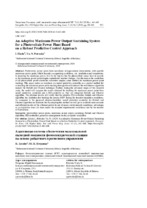| dc.contributor.author | Зорина, Т. Г. | ru |
| dc.coverage.spatial | Минск | ru |
| dc.date.accessioned | 2017-05-17T11:14:28Z | |
| dc.date.available | 2017-05-17T11:14:28Z | |
| dc.date.issued | 2017 | |
| dc.identifier.citation | Зорина, Т. Г. Регламентирование деятельности блок-станций на традиционных видах топлива = Function Regulation of Customer’s Plant that Burn Traditional Types of Fuel / Т. Г. Зорина // Энергетика. Известия высших учебных заведений и энергетических объединений СНГ. – 2017. – № 3. – С. 276-286. | ru |
| dc.identifier.uri | https://rep.bntu.by/handle/data/29942 | |
| dc.description.abstract | Статья посвящена проблеме регламентирования деятельности блок-станций на традиционных видах топлива. Целью являлась разработка мер по ограничению влияния блок-станций на Белорусскую энергосистему, поскольку их деятельность имеет негативные экономические последствия. При выполнении исследования были использованы такие методы, как системный анализ, метод аналогий и учета затрат. Проведена сравнительная характеристика энергопроизводства в типовой рабочий день отопительного периода 2013 и 2014 гг. в разрезе конденсационных электростанций, теплоэлектроцентралей и блок-станций. Рассчитан потенциальный ущерб, наносимый блок-станциями энергосистеме, сделан анализ существующих в Республике Беларусь ограничений негативного влияния блок-станций. Разработан комплекс мер в рамках политики регламентирования деятельности блок-станций на традиционных видах топлива: плата за горячий резерв, необходимый энергосистеме в случае отказа работы блок-станции; плата за диспетчеризацию; плата за передачу и распределение. Преимуществами от принятия предлагаемых мер являются: качественный рост энергоэффективности электроэнергетики; снижение себестоимости электрической энергии в целом по энергосистеме; стимулирование рыночных элементов в электроэнергетике; возможность достаточно быстро реагировать на изменение экономических условий. | ru |
| dc.language.iso | ru | ru |
| dc.publisher | БНТУ | ru |
| dc.subject | Customer’s plant | en |
| dc.subject | Installed power | en |
| dc.subject | Load curve | en |
| dc.subject | Fuel overconsumption | en |
| dc.subject | Fee for hot spare | en |
| dc.subject | Fee for dispatching | en |
| dc.subject | Fee for transmission | en |
| dc.subject | Fee for distribution | en |
| dc.subject | Belarusian power supply system | en |
| dc.subject | Electric power dispensing | en |
| dc.subject | Power-and-heating plant | en |
| dc.subject | Condensing power plant | en |
| dc.subject | Блок-станция | ru |
| dc.subject | Установленная мощность | ru |
| dc.subject | График нагрузки | ru |
| dc.subject | Перерасход топлива | ru |
| dc.subject | Горячий резерв - плата | ru |
| dc.subject | Диспетчеризация - плата | ru |
| dc.subject | Передача энергии - плата | ru |
| dc.subject | Распределение энергии - плата | ru |
| dc.subject | Белорусская энергосистема | ru |
| dc.subject | Электрическая энергия - отпуск | ru |
| dc.subject | Теплоэлектроцентраль | ru |
| dc.subject | Конденсационная электростанция | ru |
| dc.title | Регламентирование деятельности блок-станций на традиционных видах топлива | ru |
| dc.title.alternative | Function Regulation of Customer’s Plant that Burn Traditional Types of Fuel | en |
| dc.type | Article | ru |
| dc.relation.journal | Известия высших учебных заведений и энергетических объединений СНГ. Энергетика | ru |
| dc.identifier.doi | 10.21122/1029-7448-2017-60-3-276-286 | |
| local.description.annotation | This article deals with the issue of function regulation of customer’s plants that burn traditional types of fuel. Its aim was to develop certain measures for reducing customer’s plants influence on the Belarusian power supply system as their activity has unfavorable economic consequences. The following methods were used in the present research: the system analysis, the method of analogies and expenses calculation. The article presents the comparative characteristics of the power production during the typical working day of the heating period in the years 2013 and 2014 in terms of condensation power plants, central heating and power plants and customer’s plants. The potential damage caused by the customer’s plants to the power supply system has been calculated, the restrictions for the customer’s plants activity existing in the Republic of Belarus nowadays has been analyzed. The author has developed a number of measures within the framework of regulation policy of the activity of customer’s plants that burn traditional types of fuel: the fee for the spinning reserve necessary for the power supply system in case of the customer’s plants breakdown; the fee for the supervisory control; the fee for the service of transfer and distribution. The introduction of the proposed measures is supposed to bring the following advantages: high-quality growth of energy efficiency of the power industry; prime cost reduction of power energy in the power supply system as a whole; stimulation of market elements implementation in the power industry; the ability to react fairly fast to the alterations of economic conditions. | en |




